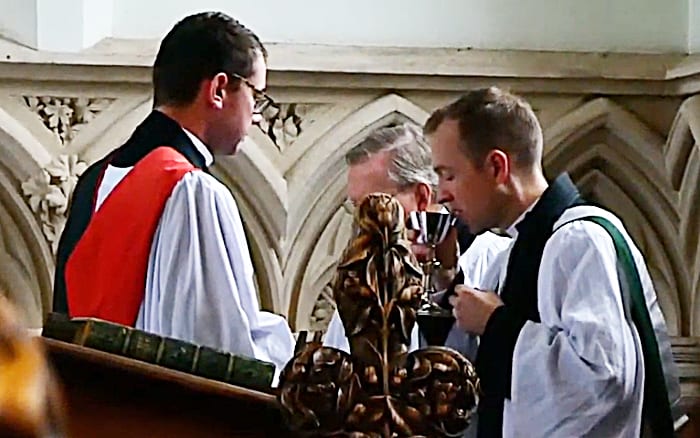
WHEN a group of top UK lawyers are asked for their opinion on – of all things – communion cups, you can only shake your head in disbelief.
This tale has its beginning in March when the Archbishops of Canterbury and York said churches should not use a single shared cup – or chalice – for communion wine because of the risk of transmitting Covid-19. Which makes perfect sense.
But then, at July’s Church of England General Synod, Mary Durlacher, an evangelical lay member , suggested the use of individual cups for wine was a “valid, common sense, pro tem” way forward.
Things then started to get ugly.

Her suggestion was dismissed as “illegal” by the Bishop of London Sarah Mullally, above. She said that the church’s Legal Advisory Commission believed it was:
Contrary to law for individual cups to be used for each communicant.
The bishop cited an obscure 16th century law, the 1547 Sacrament Act, which concerns those who:
Unreverentlie speake against the Sacrament of the bodie and bloude of Christe.
Durlacher was not going to be brushed off that easily. So she invited the legal eagles to give their opinion. According to Christian Today, the six leading QCs and barristers said in a statement last week they believe that individual chalices are lawful
The “hard-hitting” legal opinion by the lawyers said:
The House of Bishops’ present position – that the use of individual cups for distributing communion is illegal – is incorrect as a matter of law. There is no legal barrier to the use of individual cups.
They added:
In our opinion, there is no bar in the Sacrament Act 1547 to the use of individual cups when distributing communion in both kinds, and neither the Canons of the Church of England nor the rubrics of the Book of Common Prayer contain or impose any prohibition.
Consequently, there are no grounds for concluding that the use of individual cups at communion is contrary to the law. The conclusion that individual cups are legal is a conclusion which is reached, as a matter of law, independent of the present public health emergency. They were legal before the first case of Covid-19, they are currently legal, and they will continue to be legal when the pandemic is over.
The opinion was delivered by Stephen Hofmeyr QC, Mark Cawson QC, Andrew Wales QC, Carolyn Johnson, Carl Fender and Jonathan Schaffer-Goddard.
Ultimately, it is for a court of law to pronounce on whether a particular view of the law is correct or not, so this legal opinion does not necessarily mean churches have a clear green light to go ahead and use individual cups, unless an official legal verdict is reached.
The lawyers say the opinion of the church’s Legal Advisory Commission (LAC) given at Synod:
Does not accurately reflect the law and therefore the position taken by the House of Bishops is based on an incorrect foundation. We believe that there is no legal barrier to the use of individual cups and that, by the use of individual cups, the distribution of communion in both kinds is lawful.
They said that the LAC view is:
A complete misreading of the Act … There is no prohibition in the Act on the use of individual cups to distribute communion because the Act is entirely silent on the question of the methods for delivering and ministering communion. It is simply not concerned with the matter. Therefore, unless there is some prohibition elsewhere in either the common law or canon law, there can be no basis for saying that there is a legal bar to the use of individual cups to distribute communion.
And in a challenging aside, they said that if individual communion cups are unlawful, then separate communion wafers – rather than one shared loaf of bread – might well be too:
The question that arises… is, on what basis might individual cups be said to be unlawful that would not equally apply to individual wafers?
Leading Anglican theologian Dr Andrew Goddard had already described the bishops’ ban on communion cups as:
Legally dubious … biblically baseless, theologically erroneous, and likely to prove pastorally damaging.















